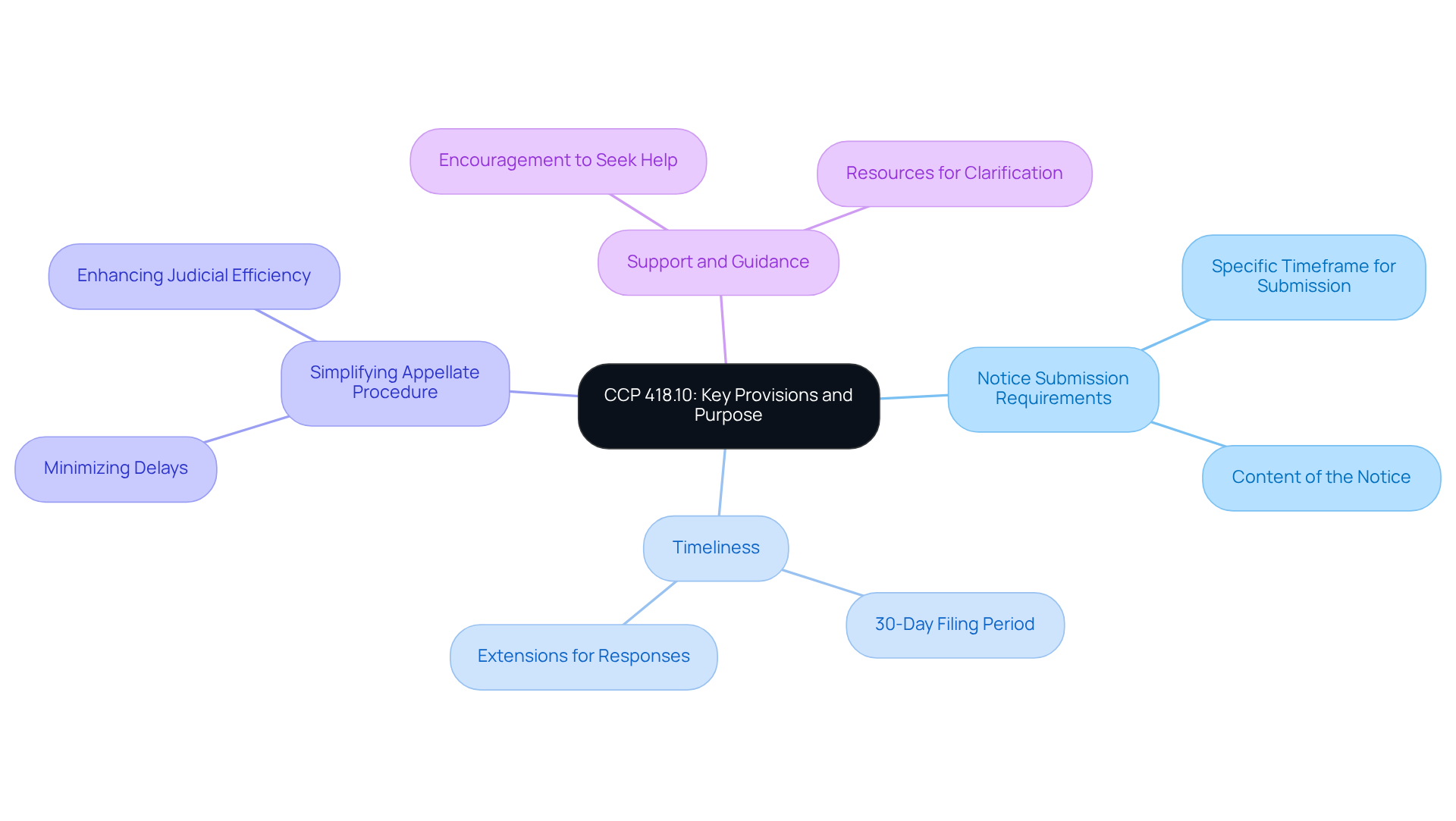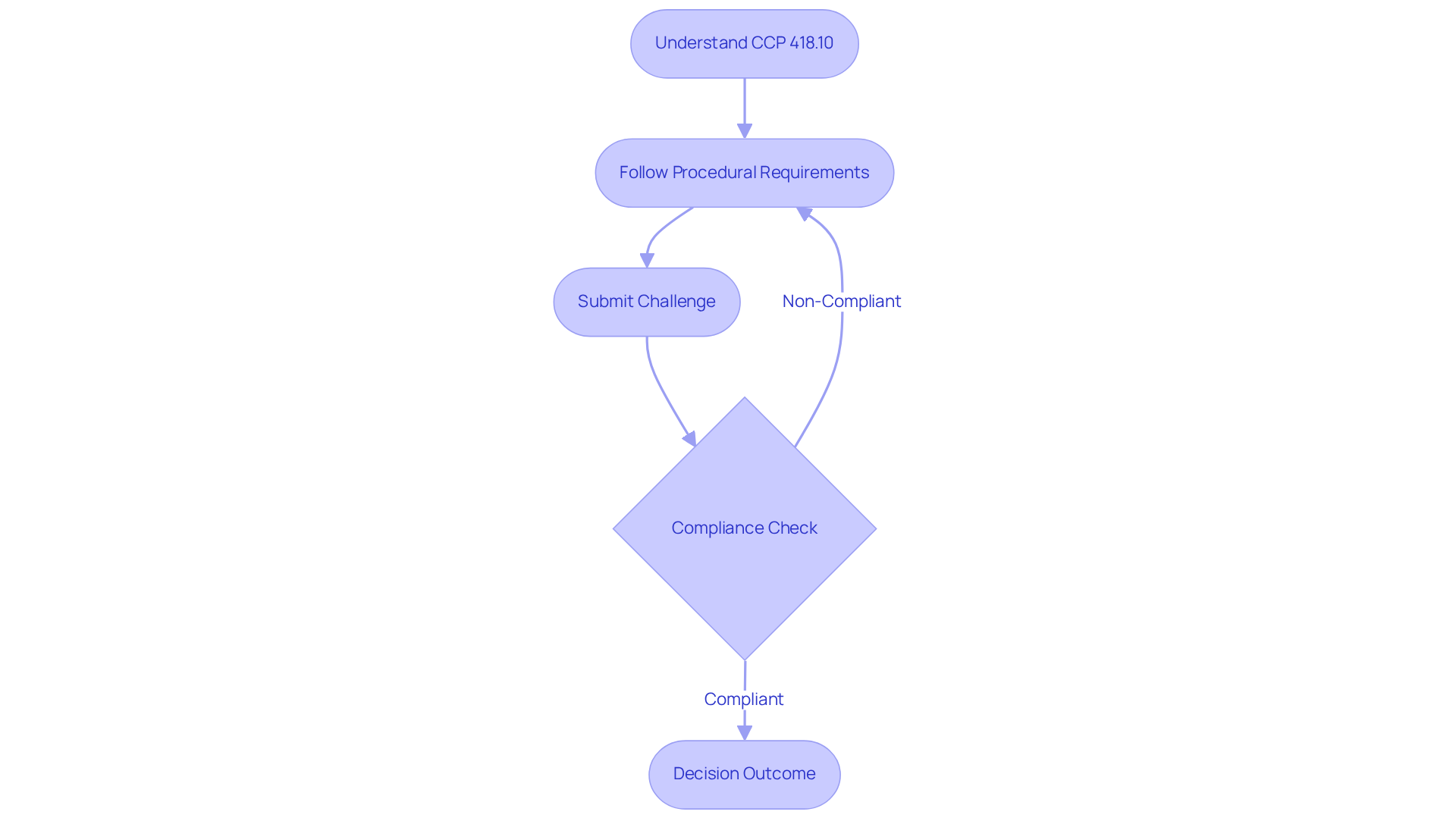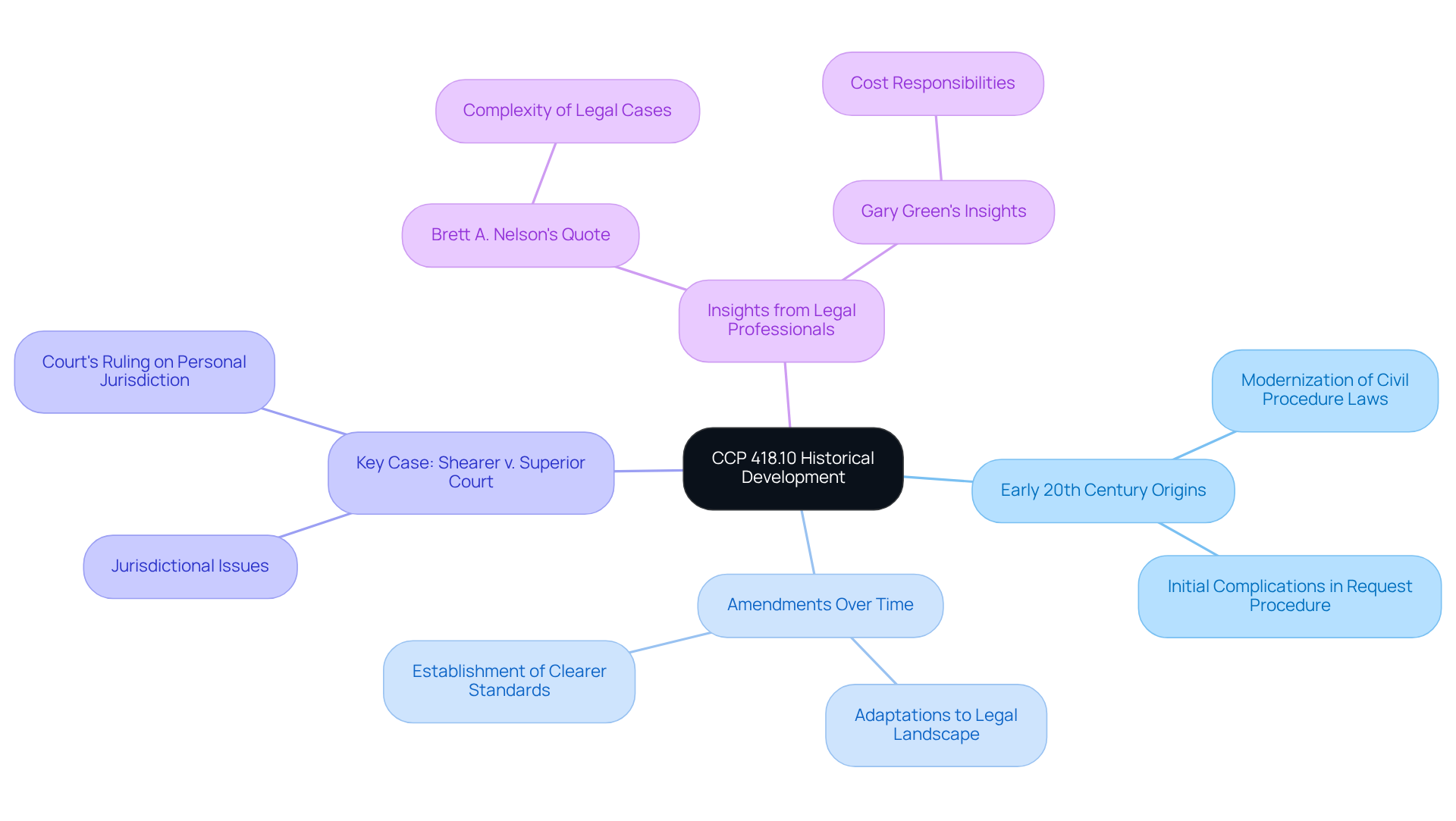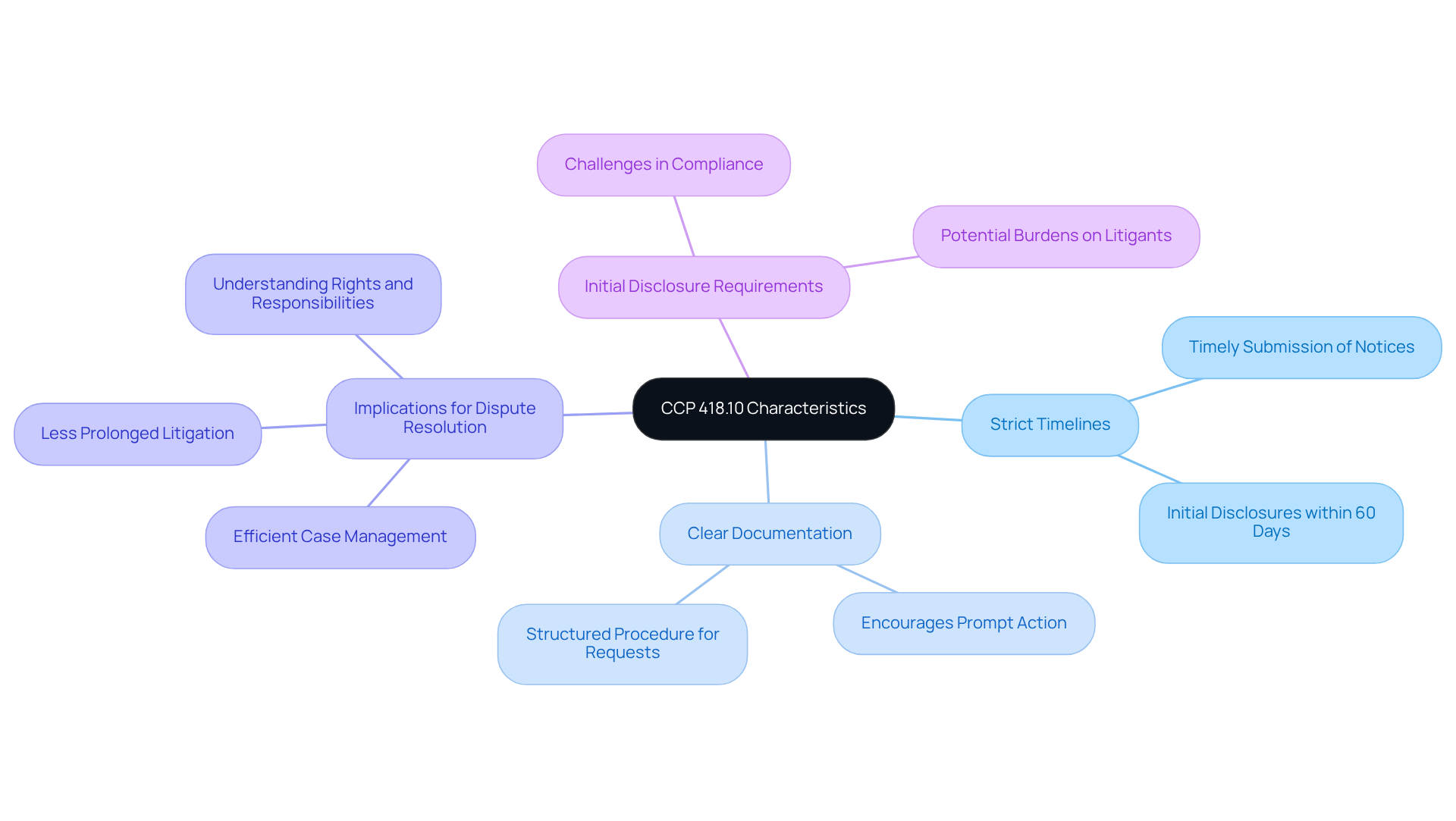
Understanding ccp 418.10: Definition, Context, and Key Features
Overview
This article aims to clarify the definition, context, and key features of CCP 418.10 within the California Code of Civil Procedure. We understand that navigating legal processes can be overwhelming, and it's important to feel informed and supported. CCP 418.10 is here to help streamline the appellate process, establishing specific timelines and procedural requirements for submitting notices. This not only enhances judicial efficiency but also ensures that you are fully aware of your rights and responsibilities.
By implementing these changes, we hope to make the experience smoother for everyone involved. Imagine how much easier it will be to navigate the appellate process with clear guidelines in place. This is about making sure you feel empowered and supported every step of the way. Together, we can work towards a more efficient system that respects your time and needs.
Introduction
Navigating the intricacies of legal procedures can often feel like wandering through a labyrinth, particularly when it comes to appellate processes. CCP 418.10 emerges as a crucial component of the California Code of Civil Procedure, thoughtfully designed to simplify how parties submit notices in civil cases. By clearly outlining the requirements and timelines for appeals, this statute not only seeks to enhance judicial efficiency but also aims to empower you on your legal journey.
Yet, as you delve into the complexities of compliance, it’s natural to wonder: how can you effectively navigate these regulations without stumbling into procedural missteps? This question is not just about rules; it’s about ensuring that your voice is heard and your rights are protected. Together, let’s explore how understanding these nuances can lead to a smoother path forward.
Define CCP 418.10: Key Provisions and Purpose
CCP 418.10 is an important clause within the California Code of Civil Procedure that outlines what is required for a party to submit a notice in civil cases. It’s essential to understand that a notice of challenge must be submitted within a specific timeframe after the ruling or order being contested. This statute is designed to ensure that appeals are handled efficiently, making sure that you are informed of your rights and responsibilities regarding the appeal process.
The aim of CCP 418.10 is to simplify the appellate procedure. By doing so, it minimizes delays and enhances judicial efficiency, which can be a relief during what can often be a stressful time. We want you to feel confident and supported as you navigate this process, knowing that there are clear guidelines in place to help you.
If you have any questions or concerns about how to proceed, remember that you are not alone. We encourage you to reach out for support and clarification, ensuring that your voice is heard and respected throughout this journey.

Contextualize CCP 418.10: Its Place in California Law
The California Code of Civil Procedure, specifically ccp 418.10, plays a crucial role in guiding civil litigation within our state. It serves as an essential part of the appellate system, ensuring that all parties follow specific procedural requirements when they seek to challenge a lower court's ruling. This framework is designed to promote fair and effective legal processes, establishing clear timelines and criteria for submitting challenges. By doing so, the CCP not only upholds the integrity of our judicial system but also helps resolve disputes in a timely manner.
Adhering to these procedural requirements is vital. When parties fail to comply, their requests may be rejected, which can diminish the overall effectiveness of the appellate system. This emphasis on procedural adherence reflects a commitment to maintaining order and predictability in legal proceedings, ultimately benefiting everyone involved. For example, in the case of Shearer v. Superior Court, the court underscored the importance of timely compliance with these requirements, which directly influenced the case's outcome.
Moreover, research shows that following ccp 418.10 significantly boosts compliance rates in the appellate process, highlighting its importance. As attorney Gary Green wisely noted, "The choice of a lawyer is an important decision and should not be based solely upon advertisements." This statement reminds us of the need for informed decisions in legal matters, including understanding procedural compliance.
It's also essential to grasp the financial implications of requests, such as attorney fees and expenses. This understanding is crucial for individuals navigating the appellate landscape, as it can help them make more informed choices. Together, we can work through these complexities, ensuring that your rights and interests are well-protected.

Trace the Origins of CCP 418.10: Historical Development
The origins of the California Code of Civil Procedure (CCP) can be traced back to the early 20th century, a time when California sought to modernize its civil procedure laws. This provision has undergone several amendments, adapting to the changing legal landscape and addressing the needs of those involved in litigation. Initially, the request procedure was quite complicated, leading to delays and confusion for many parties.
As attorney Brett A. Nelson insightfully points out, "Cases that seem simple or straightforward rarely are, and you need a lawyer in your corner who can offer you an honest assessment that will help you make the best choices for your case." This statement resonates deeply, highlighting the complexities involved in legal procedures, which the CCP aims to clarify. Over time, CCP 418.10 has been refined to establish clearer standards for submitting requests, reflecting a broader movement toward efficiency and accessibility within the legal system.
Consider the case of Shearer v. Superior Court, which illustrates the practical implications of this provision. The court ruled on jurisdictional issues, underscoring the importance of procedural clarity. This historical perspective serves as a reminder of the critical role that procedural clarity plays in promoting effective dispute resolution.
In navigating these intricacies, remember that you are not alone. We are here to support you in understanding these processes, ensuring that you feel empowered and informed every step of the way.

Examine Key Characteristics of CCP 418.10: Implications for Dispute Resolution
The key characteristics of the CCP are its strict timelines for submitting notices and the need for clear documentation. These provisions are crucial for dispute resolution, as they encourage parties to act promptly and ensure that all necessary information is provided on time. This approach can lead to more efficient case management and lessen the chances of prolonged litigation. Importantly, the clarity provided by the CCP helps everyone understand their rights and responsibilities, fostering a more structured way to resolve disputes. By creating an organized procedure for requests, the efficient legal system is ultimately contributed to by CCP 418.10.
Effective January 1, 2024, the requirement for initial disclosures within 60 days further highlights the importance of timely action in civil cases. This change aims to streamline the discovery process, though it has raised concerns about potentially burdensome disclosure requirements. For example, the recent amendments to the Code of Civil Procedure sections 2016.090 and 2023.050 illustrate the challenges litigators face in meeting these new rules. Parties must navigate the complexities of compliance while ensuring their appeals are filed within the designated timeframes. The implications of CCP 418.10 extend beyond simple procedural requirements; they shape the litigation landscape in California, influencing both the pace and outcomes of disputes.
How do you feel about these changes? Understanding the new rules can be daunting, but you are not alone in this journey. Together, we can navigate these complexities and work towards a more efficient legal process.

Conclusion
Understanding CCP 418.10 is essential for navigating the complexities of civil litigation in California. This provision not only outlines the procedural requirements for submitting notices but also aims to streamline the appellate process, ensuring that all parties are informed of their rights and responsibilities. By establishing clear guidelines, CCP 418.10 promotes efficiency and minimizes delays, ultimately enhancing the overall judicial experience.
Throughout this discussion, we have highlighted the significance of complying with CCP 418.10. It’s important to recognize the necessity of adhering to strict timelines and maintaining clear documentation. The historical evolution of this provision reflects its adaptability to the changing legal landscape. These characteristics are not just about procedural compliance; they play a crucial role in shaping effective dispute resolution and upholding the integrity of our judicial system.
In light of these insights, it is vital for anyone involved in civil litigation to familiarize themselves with CCP 418.10 and its requirements. Understanding this provision empowers you to navigate the legal process more effectively. It underscores the importance of timely action and informed decision-making. Engaging with these legal frameworks can lead to more favorable outcomes and a more efficient resolution of disputes. Remember, being proactive in the face of legal challenges can make all the difference.
As you reflect on this information, consider how familiarizing yourself with CCP 418.10 can enhance your experience. We are here to support you in this journey, ensuring you feel equipped to face any challenges ahead.
Frequently Asked Questions
What is CCP 418.10?
CCP 418.10 is a clause within the California Code of Civil Procedure that outlines the requirements for a party to submit a notice in civil cases.
What is the purpose of CCP 418.10?
The purpose of CCP 418.10 is to simplify the appellate procedure, ensuring that appeals are handled efficiently and that parties are informed of their rights and responsibilities regarding the appeal process.
What must be done after a ruling or order in a civil case?
A notice of challenge must be submitted within a specific timeframe after the ruling or order being contested.
How does CCP 418.10 benefit the judicial process?
By minimizing delays and enhancing judicial efficiency, CCP 418.10 helps to relieve stress during the appeal process.
What should I do if I have questions about CCP 418.10?
If you have questions or concerns about how to proceed under CCP 418.10, it is encouraged to reach out for support and clarification to ensure your voice is heard and respected.


